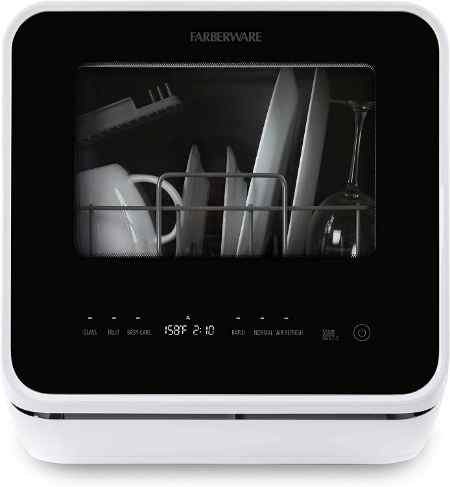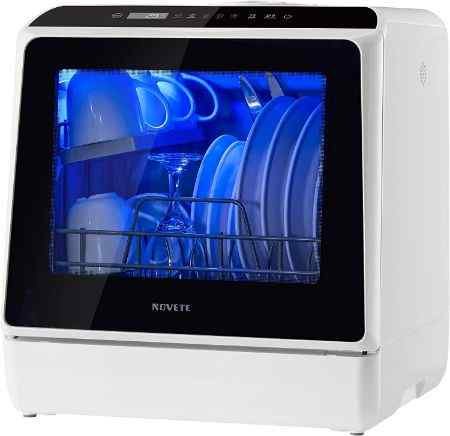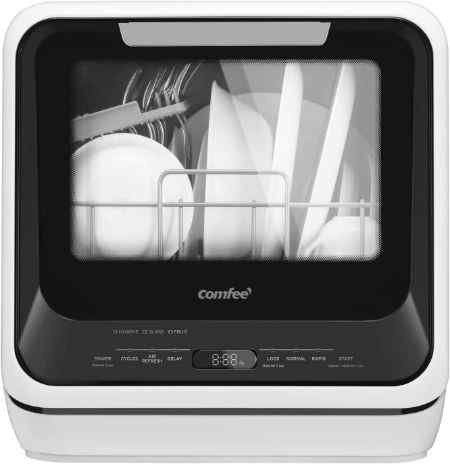
Like all household appliances, dishwashers have a limited lifespan. The duration of a dishwasher’s life can vary depending on multiple factors, including the specific model you own, and some machines may have a shorter or longer life expectancy straight out of the box.
Although having a general idea of how long a dishwasher can last is helpful when selecting a new one and planning for potential repairs or replacements, it’s important to note that newer models are often more efficient and visually appealing, leading many households to upgrade even before their current dishwasher breaks down.
On average, dishwashers tend to last around 10 years, with some lasting between 8 and 15 years before reaching the end of their operational lifespan. However, with proper care and maintenance, following the manufacturer’s recommendations for use and cleaning, you can significantly enhance the chances of your dishwasher reaching that 15-year mark.
Taking care to use your dishwasher carefully, cleaning it properly, and following the maintenance guidelines provided by the manufacturer can extend its lifespan and maximize its performance. By doing so, you can enjoy the convenience of a reliable dishwasher for many years to come.
Top Recommended Durable Dishwasher Products
Portable Dishwasher Countertop Dishwasher [Hermitlux]

Professional Compact Portable Countertop Dishwasher [Farberware]

Complete Portable Countertop Dishwasher [Farberware ]

Portable Compact Countertop Dishwashers [For Dorms, RVs, and Small Apartments]

Portable Mini Dishwasher Countertop – COMFEE [For Apartments& RVs]

Essential Factors Affecting the Longevity of Your Dishwasher
Similar to other household appliances, the lifespan of your dishwasher depends on several key factors. While usage frequency is an obvious consideration, two additional factors often go unnoticed.
Water Temperature
Opting for the hot water setting instead of cool or cold can significantly extend the lifespan of your dishwasher. The higher temperature of the water aids in dissolving dirt and prevents the clogging of filters, which can lead to premature wear and tear.
Dry Setting
Although the heat-dry setting may seem convenient, it can accelerate the aging of your dishwasher. The constant exposure to high heat can cause the heating element to fail and make the inner shell brittle. To ensure a longer lifespan, it is recommended to use the air-dry setting.
Price Does Not Always Guarantee Durability
Contrary to popular belief, the price tag of your dishwasher does not always correlate with its longevity. While high-end models may offer more features, adjustable wash cycle times, and enhanced cleaning power, it does not necessarily mean they will outlast cheaper models.
Top Advice for Increasing Your Dishwasher’s Lifespan
Dishwasher purchases can range in price from $250 to $2,000, with installation often costing $1,000 or more. It’s essential to maintain your dishwasher in top shape for a longer lifespan with such an investment. The frequency of usage, the quality of the water, the installation process, and maintenance can all have an impact on how long your dishwasher lasts. Use this professional advice to extend the life of your dishwasher and make sure it keeps operating well for years to come.
Properly Dispose of Food Scraps and Rinse Dishes
Throwing away food scraps and rinsing your dishes before loading them is a simple yet effective way to prolong your dishwasher’s lifespan. Food particles can clog filters and scraps like bones can damage the drain pump. While thorough washing is not required, dishes should be mostly clean.
Regularly Clean the Food Filter
Every ten dishwasher cycles or after heavy loads, make sure to clean the food filter to prevent clogging of the drain hose and ensure optimal performance.
Use Dishwasher-Safe Soap
Only use soap specifically designed for dishwashers. Using the wrong type of soap, such as liquid dish soap or other cleaners, can cause damage to your dishwasher, including leaks or floods. Avoid overfilling the soap dispenser or adding extra soap to the bottom.
Load Dishes Properly
While modern dishwashers are designed to accommodate a large number of dishes, overloading or obstructing the wash arms can cause damage. This may also result in dishes not being cleaned thoroughly, leading to additional cycles and faster wear and tear on the dishwasher.
The Key Is Regular Cleaning
A common misconception is that dishwashers automatically clean themselves after each cycle. Mineral deposits and food residue, however, can build up over time. Every three to six months, you must give your dishwasher a thorough cleaning to keep it operating efficiently. Alessandro Gazzo of Emily’s Maids suggests, “Run a full cycle at the highest temperature setting and put a cup of white vinegar in a dishwasher-safe cup.” “Vinegar is a powerful disinfectant and cleaner for your dishwasher.” To maximize the operation of your dishwasher, don’t forget to routinely clean or replace the filter.
Choose hot water
The best option for your dishwasher and your dishes is to use hot water, even though this may increase energy use. Hot water ensures a thorough clean by effectively breaking down fatty meals and preventing the development of residue.
Scrape your plates, but omit to rinse
Scrape out any large food particles from your plates before loading them into the dishwasher to prevent clogging the sprayers and filters. Contrary to popular perception, washing your plates before putting them in the dishwasher is not necessary and has the potential to reduce efficiency. To correctly activate detergent, dishwashers are made to cooperate with food particles.
Do not overload.
Your dishwasher may experience undue strain if it is overloaded, which will eventually limit its performance. When your dishwasher is overloaded, water sprayers may become clogged, resulting in uneven cleaning and possible dishwasher damage. Examine the spray openings frequently, and use a soft brush or toothpick to remove any debris.
Hoses Should Be Replaced Frequently
For greater durability and endurance, consider switching to a stainless steel inlet hose if your dishwasher’s regular rubber inlet line has to be replaced.
Prevent the Buildup of Hard Water
Hard water symptoms can include opaque mineral films, accumulation, resistance in the rack wheels, and discoloration in your dishwasher. To avoid clouding and improve cleaning performance, think about utilizing a water-softening system or regeneration salt.
Observe the Directions Given by the Manufacturer
An owner’s manual that offers instructions on how to use and maintain the dishwasher is included with each unit. It’s essential to adhere to the manufacturer’s recommendations to make sure your dishwasher runs smoothly and lasts a long time.
Put proper ventilation first.
Appliances that use water, like dishwashers, washing machines, and wet vacuum cleaners, require proper ventilation. Make sure your dishwasher has adequate ventilation by opening a nearby window or keeping the door open to let air and sunlight in after each usage. Natural heat and airflow are your allies in maintaining your dishwasher in good condition since they assist prevent the growth of mold and mildew.
You may increase the lifespan of your dishwasher, guarantee its peak performance, and safeguard your investment by heeding this professional advice. The key to extending the life of your dishwasher is to keep it clean frequently, use hot water, avoid overloading, replace the hoses, fight hard water accumulation, adhere to instructions, and prioritize appropriate ventilation. Your dishwasher will continue to function properly for many years to come if you give it the right care and upkeep.
Indications That Your Dishwasher Needs Repair or Replacement
As the lifespan of dishwashers is closely tied to usage frequency and maintenance, determining the right time for replacement can be challenging. On average, it is advisable to start budgeting for a new dishwasher after approximately eight years. However, regular maintenance and vigilance for warning signs of potential issues can help in making an informed decision.
Consider repair or replacement if you observe several of the following signs or consistently encounter the same issues with your dishwasher:
- Dishes do not come out clean after a cycle
- Persistent leaks, even after cleaning or replacing door seals
- Rust in the dishwasher tub or on the door latch
- Lingering odors inside, even after a cleaning cycle
- Cracks in the dishwasher tub
- Unusual noises during the operation
- Water accumulation in the bottom after a cycle
- Mid-cycle shutdowns
By being mindful of these factors and following best practices for usage and maintenance, you can help prolong the lifespan of your dishwasher and make the most out of your investment.
Should You Replace or Repair Your Dishwasher?
Both the cost of repairs and the overall state of the appliance are important considerations when deciding whether to repair or replace a dishwasher. It can be more cost-effective to replace the appliance if a qualified repairman determines that the cost of repairs will be greater than the dishwasher’s value or if there are significant problems with the plumbing or electrical system.
On the other hand, if your dishwasher is still very new and only needs a few little fixes, like replacing tubes, filters, or knobs with more modern components, it might be worth fixing. Replace your dishwasher with one that has achieved the Energy Star if your current one is not water- or energy-efficient. If you do this, your utility costs may go down in the long run.
To analyze the state of your dishwasher and receive expert guidance on whether to repair or replace it depending on your unique circumstances, think about getting in touch with a competent specialist.
What Indicates the Need for a New Dishwasher?
Your dishwasher can last longer with the appropriate care, but occasionally it needs to be replaced. Look out for the warning indicators listed below to determine if it’s time to start looking for a new dishwasher:
Ineffective drying or cleaning: Your dishwasher may be broken and has to be replaced if your dishes still aren’t dry or clean after a full cycle.
Unusual working noises like buzzing, thumping, or loud noises could be a sign of expensive or difficult mechanical problems. If your dishwasher is noisy, think about replacing it.
Any form of leak Water leaks can ruin your kitchen floor and cabinets and may be a sign that some of your dishwasher’s internal parts aren’t working properly. If you discover any leaks, it is preferable to have it professionally inspected and, if required, replaced.
If the door doesn’t close all the way, the dishwasher’s functionality and effectiveness may be hampered. It can be a hint that a broken latch or hinge needs to be replaced.
Rust or cracking: Rust or cracking inside your dishwasher impairs its functionality and creates an environment that is conducive to the growth of bacteria. It might be necessary to replace your dishwasher if you see rust or other symptoms of wear and tear.
When the dishwasher is operating, low water pressure can prevent dishes from being fully rinsed and cleaned. A malfunctioning dishwasher water input valve or other internal components may be to blame for your persistent low water pressure problems.
A dishwasher may not drain fully, leaving remaining water behind that could potentially breed mildew. It can be a faulty pump that has to be replaced or a clogged drain pipe.
Signs to Watch Out For:
- Dishes not getting cleaned effectively
- Persistent leaks, even after cleaning or replacing door seals
- Rust in the dishwasher tub or on the door latch
- Lingering odor inside, even after a cleaning cycle
- Cracks in the dishwasher tub
- Unusual noises during the operation
- Water remaining in the bottom after a cycle
- Mid-cycle shutdowns
If you notice several of these signs or consistently encounter the same problems, it may be time to consider replacing your dishwasher.